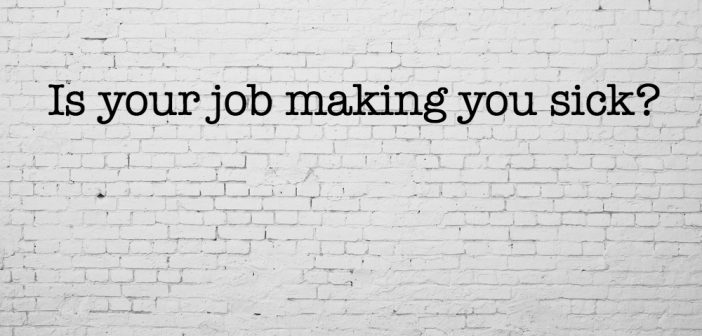For as much as I enjoy Friday afternoons and the exciting prospects of family weekend plans, I sometimes dread the thought of Monday morning. You know how it is — the early-morning rush, the long hours, and the coworker who insists on listening to speed metal in his cubicle because he claims it makes him work faster.
According to a Gallup poll, 51 percent of us aren’t engaged at work. “This means they feel no real connection to their jobs, and thus they tend to do the bare minimum,” says Anna Robaton of CBS news. And 16 percent of American full-time employees are “actively disengaged.” That means, in the illustrious lyrics of Johnny Paycheck, we have plans to “take this job and shove it.” Ironically, that would equate to Johnny “No” Paycheck, which lends itself to a new list of problems.
Let’s face it. We all have days when we are sick of work. But when we are sick BECAUSE of work — that’s a problem. If you think your job is bad for morale, here are three signs it is taking a toll on your health as well.
1.You are anxious and irritable.
Feeling nervous or anxious about an upcoming presentation or a meeting with a big client is one thing, but prolonged anxiety and irritability is a big health concern. “When the body undergoes stress and anxiety, the adrenal system produces an excessive amount of the stress hormone cortisol,” says Alissa Scheller.
Related link: 8 delicious ways to control anxiety
Cortisol is the hormone responsible for igniting the “fight or flight” response to stressful situations. “For most people, this extra blood sugar in the body can be simply reabsorbed with no real damage. However, for those at risk for diabetes, the extraneous blood sugar could potentially cause health issues,” says Scheller. Anxiety also increases the risk of cardiovascular disease, ulcers, skin rashes, and lung problems.
2. You forget things and have trouble concentrating
.
Some days are just filled with distractions, and that makes it difficult to keep track of tasks. But when you feel overwhelmed by the volume of work you face each day, those feelings of hopelessness could lead to depression. Experts at University of Utah Health Care say “empty moods”, negative or pessimistic thoughts, feelings of helplessness or restlessness, and consistent difficulty making routine decisions are all signs of depression. For many of us, that sounds like a typical Wednesday.
3. You get sick — a lot.
Most of us spend much of our day sitting and eating lunch at our desk, and both a poor diet and a lack of exercise play huge roles in our body’s ability to stave off germs. “I believe that healthy, active employees are more productive,” said Ryan Westwood, CEO of Simplus. “I encourage all of my employees to use their lunch hours to take a walk outside or take short breaks during the day to recharge and refocus. I understand that this is a fast-paced office, and we are busy. But short-term investments in health really pay off in the long run.”
Studies show that it’s not so much the job, itself, that makes you sick. Rather it’s the negativity surrounding the job that weakens your immune system. A health report published by The New York Times says that “people who are under chronic stress have low white blood cell counts and are more vulnerable to colds.” Every job has its share of stress, but if the work dynamic is negative, for example, you don’t mesh with your boss, or you are bullied by coworkers or clients, that environment affects your health.
Work culture may be a trendy buzzword in business right now, but finding a job that enforces a positive work environment can mean the difference between a healthy, engaged employee and one that resembles a walking petri dish. “I think creating opportunities for employees to contribute, whether through job development or volunteering in the community, is a great way to maintain a positive and healthy work environment,” said Westwood, who facilitates community volunteer projects for his staff every year. “Yes, it is expensive. But I consider it an investment in my employees. And the return I see in the job satisfaction of my employees and in the way they learn to interact with each other is money well spent.”
Rainy days and Mondays may always get you down, but that’s part of being an adult. But if your ability to contribute to the workplace is buried under feelings of anxiety, depression, and illness, it may be time to clock out of that job and check in to one that is better for your health.
This article was originally published by The Daily Herald.




